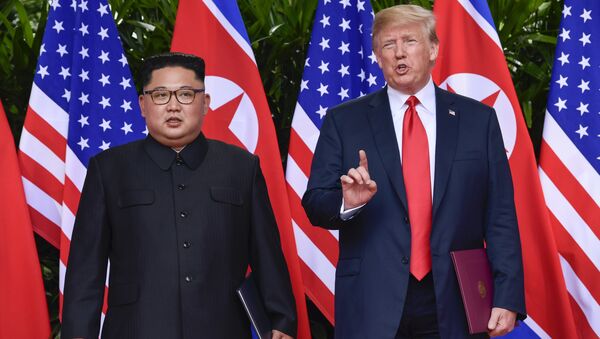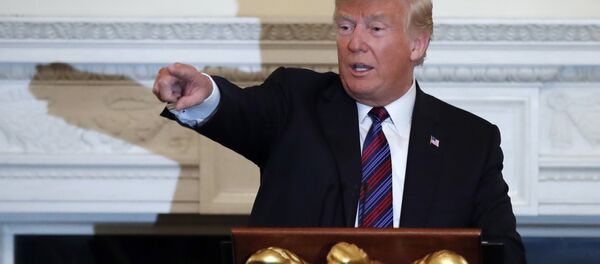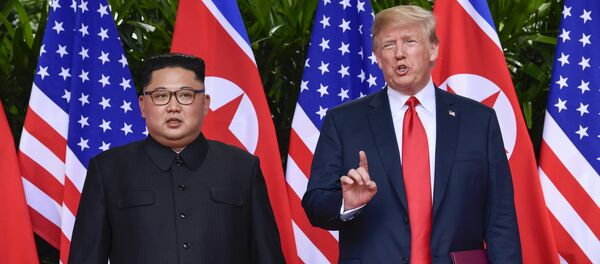After two days of negotiations in Pyongyang between South Korean President Moon Jae-in and North Korean leader Kim Jong Un, Pyongyang agreed to allow international experts to monitor the closure of the Dongchang-ri missile engine testing facility and missile launch pad, while promising to permanently shut down its nuclear facilities in Yongbyon, depending on corresponding actions from the United States.
The South Korean president is expected to travel to New York next week and meet with Trump to discuss the results of the third inter-Korean summit of the year.
Ball in US Court
While skeptics argued that North Korea’s latest offer only halts further development of its nuclear program and failed to address the threats from its existing nuclear arsenal, political analysts admitted that the overall momentum to push forward peace talks on the Korean peninsula could force the Trump administration to take corresponding actions.
READ MORE: North Korea Can't Abandon Its Nuclear Weapons — Scholar
"I think the United States, especially the Trump administration, is under the pressure, because there has been some progress [on denuclearization] right? Of course, it’s not good enough for the hardliners [US officials] such as US Senator Lindsey Graham or National Security Adviser John Bolton. Moon will bring a list of concessions from Kim Jong Un to Trump in New York. Now the ball is in your [US] court," Kim Jae-chun, an international relations professor at Sogang University in Seoul and a former South Korean government adviser, told Sputnik.
The expert suggested that Trump could finally agree to North Korea’s proposal to declare the end of the Korean War officially.
READ MORE: Trump Praises Joint Statements Made at Inter-Korean Summit in Pyongyang
At the same time, the South Korean scholar expressed serious concerns over North Korea’s latest offer on denuclearization.
"This is progress, but it’s very limited. That’s because this is in line with what Kim Jong Un has promised many times this year: it’s about future nuclear capabilities [of North Korea]. Destroying the nuclear testing sites is part of the freezing moratorium. To demolish the missile launch pad means North Korea no longer poses a threat to the United States right? But the problem is they [North Korea] also have mobile missile launchers. Denuclearization should address what you’re going to do with your existing nuclear weapons," he said.
Other political analysts suggested what kind of response the United States will have depends on whether Trump can win in the battle against the US political establishment.
"It all depends on who can take the lead in the battle between Trump and the US political establishment. It seems Trump prefers to maintain the kind of public image that the diplomatic negotiations with North Korea are continuing moving forward. I don’t think Trump cares about which area North Korea’s concessions come from. Trump is willing to accept any concrete concessions from North Korea, as he tweeted at once praising the progress during the inter-Korean summit. But the US political establishment, including many officials in the White House, would stress on reducing North Korea’s existing nuclear capabilities," Zhao Tong, a fellow in Carnegie’s Nuclear Policy Program at the Carnegie–Tsinghua Center for Global Policy in Beijing, told Sputnik.
Trump tweeted on Wednesday that the results from the inter-Korean summit are "very exciting."
READ MORE: US Must ‘Show Commitment' to Peace Talks with North Korea — Scholar
At the same time, South Korean nuclear experts argued that North Korea simply offered to dismantle the nuclear facilities that are no longer needed.
"This is like [North Korea] scratching their head, as it [what they have offered] is like the tip of an iceberg. By shutting down the testing sites of the missiles, I don’t think they need these facilities any longer. They’re done with it [developing intercontinental ballistic missiles (ICBMs)] and could temporarily stop further development. But you have to be aware that they may have other testing facilities underground. I think this [North Korea’s offer] is a clear sign that they do have some backup facilities," Suh Kune-yull, a professor of nuclear engineering at Seoul National University, told Sputnik.
The nuclear expert added that North Korea has already obtained mature technology of intermediate range ballistic missiles, which could not reach the United States, but would pose a direct threat to neighboring countries including South Korea.
Sanctions Execution in Question
While South Korea may face difficulties in implementing the economic cooperation projects with North Korea, amid strict international economic sanctions imposed against Pyongyang, the Moon administration still has a lot of flexibility thanks to the lack of authoritative execution and enforcement of United Nations resolutions on economic sanctions, political analysts argued.
READ MORE: South Korean President Departs for Peace Talks in Pyongyang
"It’s very obvious that the South Korean president is determined to push forward economic cooperation with North Korea. When it comes to enforcing the economic sanctions, South Korea has the flexibility to interpret the restrictions. If South Korea wants to describe the infrastructure projects as not against UN resolutions, it’s possible for Seoul to find good excuses, while members of the international community wouldn't want to play the role of an obstructer, amid improving relations between the two Koreas. There’s no agency that is responsible for enforcing UN resolutions. It all depends on whether the international community accept your policies or not," Zhao from the Carnegie–Tsinghua Center for Global Policy said.
South Korean scholars argued that the Moon administration should probably wait for the international sanctions to be lifted first, before pursuing economic cooperation projects with North Korea.
"I don’t know which project would be in violation of the economic sanctions. There’re many gray areas. My personal opinion is that it should be the other way around. The process of real denuclearization need to move first, and then the United States and South Korea can agree on lifting economic sanctions. After that, you can move forward with the economic cooperation projects. I think this is the order we should proceed," professor Kim from the Sogang University said.
To further improve inter-Korea relations, both countries also agreed to open a permanent family reunion center to allow war-separated family members to stay in touch through video calls and letter. The two countries would also pursue plans to bid for a chance to co-host the Summer Olympics in 2032, according to the joint statement released after the inter-Korean summit in Pyongyang.
Professor Kim pointed out that the Moon administration may believe that it is possible for South Korea to coexist with a nuclear-capable North Korea, as long as both nations are at peace and focus on economic prosperity.
"To be brutally honest with you, I don’t think Moon is interested in the denuclearization of North Korea. A lot of scholars I know have also argued: why you’re so obsessed with the denuclearization of North Korea. They argued that if South Korea and North Korea become friends, the nuclear weapons of North Korea do not pose a threat to us anymore. Think about the United States, are we threatened by US nuclear weapons? If we can build enduring peace with North Korea, for Pyongyang to maintain is core nuclear capability is not that bad," he said.
The expert warned that this kind of "peace" is fake, because it is only "peace" by the absence of war and North Korea could weaken South Korea’s interests by the threat of its nuclear weapons.
Tilting Toward North Korea’s Favor
While the demilitarizing measures may help reduce temporarily reduce tensions on the Korean peninsula, it could also hurt South Korea’s military strength, which is stronger in terms of conventional weapons compared to North Korea, political analysts warned.
"Maybe the Moon administration could accuse me of locked in the ‘Cold War’ mentality. But the measures do raise my concerns, because they [North Korea] have nuclear weapons and we [South Korea] have stronger conventional weapons capability. What the two Koreas have talked about is reducing threats from conventional weapons. If we follow the measures to lower threats from conventional weapons, they do still have nuclear weapons. Unless the military confidence building measures would lead to denuclearization sooner or later, I’m worried about the military balance of power on the Korean peninsula may tilt in favor of North Korea," professor Kim from the Sogang University said.
Professor Suh from the Seoul National University expressed concerns that military tension reduction measures could lead to South Korea lowering its guard and readiness.
READ MORE: N Korea Unlikely to Rush for Denuclearization in Inter-Korean Summit — Scholars
"We [two Koreas] are still in the fighting game, but South Korea is already lowering its guard. I think we’re doing it a bit too soon. That’s because when it comes to North Korea, they could also have weapon systems underground. They may be taking actions to lower their guard above the ground. They’re still heavily armed underground. South Korea could be left helpless, after the US Army is also being withdrawn, sooner rather than later. When Trump decides to remove the US Army in South Korea, we’ll be left to defend ourselves, but we don’t have that capability yet," he said.
The expert explained that if balance of military power on the Korean peninsula is disrupted by North Korea retaining its nuclear capabilities, South Korea could face devastating consequences.
"History is always repeating itself. If you look at the relations between India and Pakistan, or the former Soviet Union and the United States, whenever one country has a stockpile of nuclear weapons, the other also needs to obtain equal nuclear capabilities. If not, the country without nuclear weapons will have two options: one, you may choose to surrender; or you may choose to be phased out. There’s no other alternative. South Korea may have to face this tough choice in 5-10 years. I believe they may choose to surrender," he said.
When the South Korean president’s motorcade moved through the streets of Pyongyang before the inter-Korean summit, the public chanted "unification, unification" enthusiastically.






